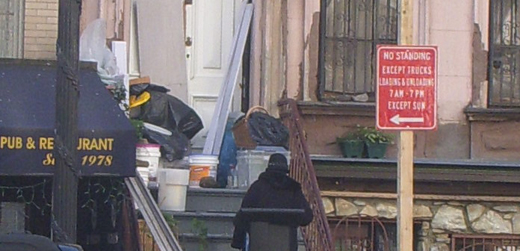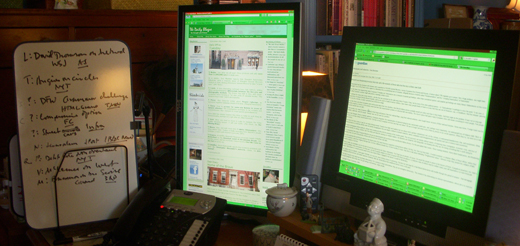Daily Office: Thursday
Thursday, December 17th, 2009
¶ Matins: Are plastic highways — roads paved of recycled rubbish — a good idea? Saritha Rai seems to think so. But we agree with the commenter who worries about the pollution of groundwater. (GlobalPost; via The Morning News)
¶ Lauds: Colm TóibÃn buys a minimalist painting — a pair, actually — only to discover their baggage of invisible meaning when he unpacks them in his Dublin flat. (LRB)
¶ Prime: While Felix Salmon scratches his head over the to-him mystifying refusal of incoming Cravath, Swain associates to take the firm’s offer to stay home for a year at a salary of $80,000, a handful of sharp law students attempt to illuminate the high-end legal profession for our British visitor. This one is for the comments.
¶ Tierce: Peter Reynolds leads off an intriguing discussion (entry and comments) on autism and the neurological basis of the sense of self, which seems to be lacking or underdeveloped in ASD patients. (Short Sharp Science)
¶ Sext: Here’s the piece that got the Editor wound up about MP3s last night. Jeremy Eichler feeds his CDs into his computer, packs them away, and muses on the death of the personal music library. (Boston Globe; via Arts Journal)
¶ Nones: You have to love the new Russia — which is really just the old, old Russia, Mother Russia. And you have to love the fact that the Cold War is over. Try to imagine, if you will, the response of any American administration from Eisenhower to Reagan to the purchase of the world’s smallest republic’s recognition of the breakaway, pro-Moscow territory of an American ally. Try to imagine how different the Russian response would be. (NYT)
¶ Vespers: Joan Acocella isn’t crazy about Peter Ackroyd’s “retelling” of Chaucer’s Canterbury Tales, but at least the book occasions a jolly essay on our tongue’s first major poet (and major writer, for the matter of that). (The New Yorker)
¶ Compline: Jonah Lehrer responds to James Surowiecki’s New Yorker column about Tiger Woods and the branders with an interesting discussion of Fundamental Attribution Error, something that we’re far more prone to than we like to think. From the TV fans to the brass at Accenture, everyone was mistaken in attributing the golfer’s formidable self-control to his character overall — they were mistaken to make the attribution, and now we know that they were mistaken.
See also Mr Surowiecki’s blogged follow-up to his column.















